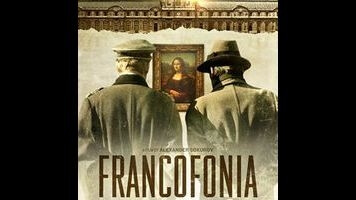Because Sokurov does almost everything in pairs or series (see: the Tetralogy Of Power, Mother And Son and Father And Son, his St. Petersburg Diary and Elegy documentaries, etc.), it was only a matter of time before he would make a companion piece of sorts to Russian Ark, set at another world-class museum. But instead of using the space of the Louvre to shape the film, à la that earlier work, he focuses on a largely forgotten historical incident: the joint effort undertaken by art historian turned high-ranking Nazi officer Franz Von Wolff-Metternich (Benjamin Utzerath) and the Louvre’s Resistance-aiding director, Jacques Jaujard (Louis-Do De Lencquesaing), to keep France’s art treasures safe during the Nazi occupation. It’s a story with all the makings of the kind of adventure Sokurov has zero interest in; Francofonia presents it in fractured pieces, distorted with artificial flickers and scratches and intentionally canned sound.
Less fluid than Russian Ark, Francofonia is even harder to pigeonhole, which is something of a feat. Narrated in docent-esque voice-over by Sokurov, the movie includes archival footage of the occupation, with dubbed-in sound effects and dialogue; a parallel narrative in which the director Skypes with the captain of a ship carrying an art collection across the Atlantic; opinionated asides about architecture; and scenes of Napoléon (Vincent Nemeth) wandering around the Louvre’s galleries, accompanied by Marianne (Johanna Korthals Altes), the national symbol of republican France. Much of it looks lovely, shot by cinematographer Bruno Delbonnel (Amélie, Inside Llewyn Davis) with the benefit of Sokurov’s typically attentive eye for texture; paintings are rarely framed presentationally, but instead at angles that emphasize surfaces and thin cracks in the paint.
These are beautiful artworks, the camera seems to say, but also fragile survivors. But despite these moments of lucid expression, Francofonia is scatterbrained, occasionally leaden (see: anything involving the Marianne figure), frequently redundant, crammed with false starts and dead ends, wrapped in gauzy greenish murk. Sokurov speaks in rhetorical questions and glib riddles. He uses the first-person plural to refer to Europeans—always a big-deal statement for a Russian artist—but still can’t go very long without bringing up the topic of Russian suffering, wondering why Hitler took such great pains to preserve Paris (“Who needs France without the Louvre?”), but not St. Petersburg, before introducing some gut-wrenching footage from the Leningrad Blockade.
Sokurov is an avant-garde anti-modernist who disdains most art made after the 19th century but embraces the possibilities of digital filmmaking. He’s a cultural reactionary, and it’s not hard to pick up on Francofonia’s ideological lines: St. Petersburg is a “great European city”; Paris is “the center of civilization”; and “other cultures, like the Muslims” aren’t worth talking about because they didn’t develop portraiture to the same degree. Francofonia tackles its conflict of militarism and civilization with a collage of digital artifice, which never quite covers up the fact that the most the movie has to say is that one is good and the other is bad. And yet, there are glimmers of Sokurov’s imagination—namely, a wordless sequence in which a Nazi officer, hands gloved in spotless black leather, looks over an ancient Egyptian mummy. It poses Francofonia’s underlying dichotomy so well that the rest of the movie seems like a series of explanatory notes.

